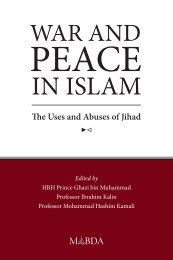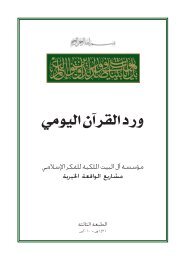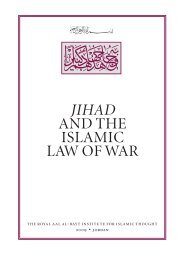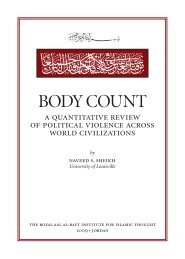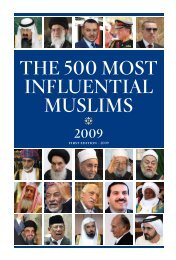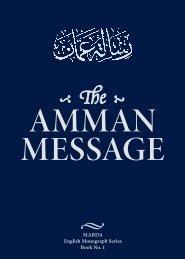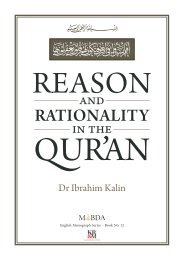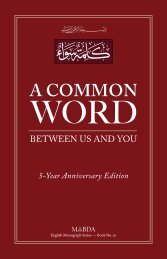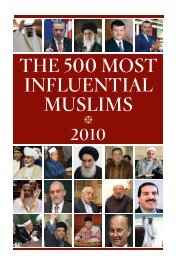Al-W¥^idÏ's Asb¥b al-Nuz‰l - The Royal Islamic Strategic Studies ...
Al-W¥^idÏ's Asb¥b al-Nuz‰l - The Royal Islamic Strategic Studies ...
Al-W¥^idÏ's Asb¥b al-Nuz‰l - The Royal Islamic Strategic Studies ...
You also want an ePaper? Increase the reach of your titles
YUMPU automatically turns print PDFs into web optimized ePapers that Google loves.
Chapter 24: Surah <strong>al</strong>-Nur<br />
set off for one of his military expedition, and so he drew lots to decide who would accompany him<br />
among us. My lot was drawn and so I travelled with the Messenger of <strong>Al</strong>lah, <strong>Al</strong>lah bless him and give him<br />
peace. This happened after the verse of segregation (Hijab) was reve<strong>al</strong>ed. I was therefore transported on<br />
my howdah and remained inside it for as long as we travelled. When the Messenger of <strong>Al</strong>lah, <strong>Al</strong>lah bless<br />
him and give him peace, finished from his military expedition, he travelled back. We were close to Medina<br />
when one night it was announced that we were to make a move. When they announced that they<br />
were moving, I w<strong>al</strong>ked until I went far beyond the camp. I relieved myself and headed back toward the<br />
camp. As I was w<strong>al</strong>king back, I felt my chest and noticed that I had dropped my necklace which was<br />
made of gems from Dhafar. I went back to look for my necklace and got delayed. <strong>The</strong> people who were<br />
in charge of my transportation came <strong>al</strong>ong, picked up my howdah and placed it on the mount I was travelling<br />
on, assuming I was inside it. Women at that time were quite slim as a result of eating very little.<br />
This is why the lightness of the howdah did not disturb any of those men when they picked it up and<br />
placed it on the mount. Moreover, I was quite young. And so they made the camel to stand and set off.<br />
My necklace was found only after they had moved camp. I went back to the camp and found it deserted.<br />
I headed toward the spot where I was camping and stayed there. I figured that people will notice my<br />
absence and come back to fetch me. As I was sitting in my location, my eyes dropped and I slept. Safwan<br />
ibn <strong>al</strong>-Mu‘attil <strong>al</strong>-Sulami/<strong>al</strong>-Dhakwani had camped behind the army. He set off the night before and by<br />
morning he reached my spot. He saw the silhouette of a person sleeping and came toward me. When he<br />
saw me, he recognized me because he had seen me before I was commanded to stay out of the sight of<br />
men. When he said ‘Verily, we are unto <strong>Al</strong>lah and unto Him we sh<strong>al</strong>l return’, 6 upon recognizing me, I<br />
woke up and covered my face with my outer garment. By <strong>Al</strong>lah, he did not speak to me with another<br />
word nor did I hear him utter any other words except ‘Verily, we are unto <strong>Al</strong>lah and unto Him we sh<strong>al</strong>l<br />
return’. He made his camel kneel down, stepped on its front legs [so that it does not move suddenly] and<br />
I mounted it. He led the mount until we caught up with the army which had stopped to rest from the heat<br />
of the afternoon. Slander against me started at that point, and the main person behind it was ‘Abd <strong>Al</strong>lah<br />
ibn Ubayy ibn S<strong>al</strong>ul. When we arrived at Medina, I fell ill for a month, <strong>al</strong>l while people were engaged in<br />
the t<strong>al</strong>k of those who slandered me. What made me bewildered during the time I was ill was that the<br />
Messenger of <strong>Al</strong>lah, <strong>Al</strong>lah bless him and give him peace, did not show toward me the gentleness I was<br />
used to see from him when I was sick. He would enter, greet me the greeting of peace and simply say<br />
‘how art thou’ This used to pain me but I was still unaware of the evil that was going on. I started going<br />
out after my he<strong>al</strong>th improved. I went <strong>al</strong>ong with Umm Mistah toward the location where we relieve ourselves.<br />
We did not go to this location except at night. This happened before we had lavatories at our<br />
houses. Before that our custom was that of the Arabs as far as relieving oneself is concerned, we disliked<br />
having lavatories close to our houses. I went out with Umm Mistah to the lavatory’. Umm Mistah was the<br />
daughter of Abu Ruhm ibn ‘Abd <strong>al</strong>-Mutt<strong>al</strong>ib ibn ‘Abd Manaf and her mother was the daughter of Sakhr<br />
ibn ‘Amir; she was the matern<strong>al</strong> aunt of Abu Bakr <strong>al</strong>-Siddiq and her son was Mistah ibn Uthathah ibn<br />
‘Abbad ibn <strong>al</strong>-Mutt<strong>al</strong>ib. As we were returning home, after we finished, Umm Mistah stumbled on her<br />
raiment and fell. She said [out of anger]: ‘May Mistah be wretched!’ I said to her: ‘What an awful thing to<br />
say! Do you insult a man who has fought at Badr’ She said: ‘Did you not hear what he said’ ‘And what<br />
did he say’ I asked. And so she informed me about the slander perpetuated against me. I got even more<br />
ill. When I went back to my house, the Messenger of <strong>Al</strong>lah, <strong>Al</strong>lah bless him and give him peace, came in<br />
and after greeting me and asking me how I was, I said: ‘<strong>Al</strong>low me to go to my parents!’ I wanted then to<br />
ascertain the matter from both of them. <strong>The</strong> Messenger of <strong>Al</strong>lah, <strong>Al</strong>lah bless him and give him peace,<br />
gave me permission to go to my parents. I asked my mother: ‘Mother, what are people saying about me’<br />
She said: ‘My daughter, pay little attention to what is being said. By <strong>Al</strong>lah, it is seldom that a man marries<br />
a beautiful woman except that the other co-wives cause troubles for her’. I said: ‘Glory be to <strong>Al</strong>lah, did<br />
people say this about me and the Messenger of <strong>Al</strong>lah, <strong>Al</strong>lah bless him and give him peace, heard about<br />
it’ When she answered in the affirmative, I cried <strong>al</strong>l night until the morning. I could not stop crying nor<br />
was I able to sleep’. When revelation was slow to come, the Messenger of <strong>Al</strong>lah, <strong>Al</strong>lah bless him and give<br />
him peace, summoned ‘<strong>Al</strong>i ibn Abi T<strong>al</strong>ib and Usamah ibn Zayd to consult them about leaving his wife.<br />
As for Usamah ibn Zayd, his advice to the Messenger of <strong>Al</strong>lah, <strong>Al</strong>lah bless him and give him peace, was<br />
given on the basis of his knowledge that the Prophet’s wife was innocent and <strong>al</strong>so because of the affection<br />
6<br />
This Qur’anic expression is known as Istirja‘, and apart from its obvious meaning, it is used in many other contexts such as expressing<br />
one’s utter helplessness or bewilderment or even protest.<br />
165



